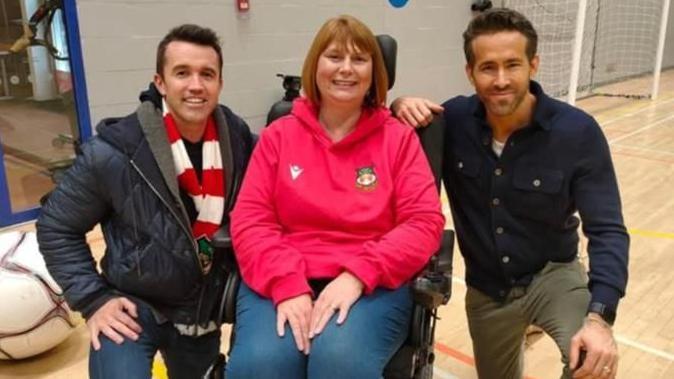
Behind the newfound glitz and glamour of Wrexham AFC, people like Kerry Evans have acted as a pillar throughout the transition.
Previously not even a football fan, she now makes sure no-one gets left behind as the club’s disability liaison officer, and is also familiar face on the Netflix series Welcome to Wrexham.
While Kerry says she originally “wrote herself off” after becoming paralysed following a cerebral brain bleed at the age of 30, having to adapt to receiving full-time care overnight, her new-found fame now sees her getting stopped in the street.
If someone had said to her that one day she would be doing her job, she said “she would never have believed them”.
Kerry worked as a nurse before her role at Wrexham AFC, but said she was out of work for a long time after having a subarachnoid haemorrhage, an uncommon type of stroke caused by bleeding on the surface of the brain.
One day she said she was picking up her daughter from school, the next she had collapsed and was fighting for her life.
As a result Kerry was paralysed down one side and told she would not walk again, as her husband quit his job to become her full-time carer.
Speaking to BBC Radio 4 Woman’s Hour, Kerry admitted both herself and her family “grieved” her past self for those first 12 months after the incident, as they grappled to come to terms with the new normal.
Kerry said she did not want to go out, and when she did she would avoid people she knew in the town, or would ask her husband to go the long way round.

From there, thanks to her husband Kinglsey, Kerry got into football.
As a lifelong Wrexham fan he would run its radio station, Dragonheart, while Kerry would go along to get “out of the house” while he would interview players.
It wasn’t long until she started to get more and more involved as a supporter.
According to Kerry, if someone had said to her one day she would be doing her job, she said “she would never have believed them”.
As the first disability liaison officer at Wrexham AFC, it was a suggestion she had pitched to the club after being impressed with the support she received from an officer at an away game at Macclesfield.
Initially, Kerry thought her position would be a meet and greet type role, but said her involvement developed over the years.
“It’s an absolutely fantastic job and what a privilege to be able to help families attend Wrexham football club,” said Kerry.
Prior to the job, Kerry admitted she had a very “stereotypical able-bodied view” of what disability was, as she knew what it was like to live an able-bodied life.
“It’s only when starting that journey do you realise there are so many hidden disabilities,” she said.
Now working her 10th season at the club, Kerry has put in place several measures to improve accessibly and inclusivity at Wrexham games, both home and away.
She has brought in powerchair football for wheelchair uses, as well as wheelchair-accessible away travel, something which the club did not have in place before her role.
“If able-bodied fans can go to away matches, so should wheelchair users.”
Kerry also introduced an autism-friendly quiet zone to the club before the takeover, which she said had “changed lives beyond belief” and required her own fundraising efforts to get it over the line.

Working on a voluntary basis right up until Reynolds and McElhenney bought the club, Kerry said one of the first things they did was to put her on a full-time contract with a salary.
“I was told Ryan and Rob were going to be in touch, and I spent the following two to three days panicking, awaiting the call,” said Kerry.
But her worries soon subsided as she received a call from California. McElhenney, she said, had clearly done his research about her work at the club, and said both he and Reynolds wanted her to be involved in their journey.
“To which I said yes please,” said Kerry, who was put on a full-time contract after five years of voluntary work.
Since the takeover, Wrexham have climbed up the ranks, sealing three consecutive promotions and securing a place in the Championship – just one division below the promised land of the Premier League.
Kerry, who also has cerebral palsy, described her role as her “calling” rather than a job, and is now committed to making a difference.

Despite the life-altering events she has faced, Kerry thanks football for finding herself, first as a fan and then through advocacy, as she puts in her memoir book – Stronger Than You Think.
“Working on the book was like spending months and months in therapy,” she said.
“You put bad memories in a box, it was upsetting but rewarding to face these memories.”
Kerry says while the club has already done so much to improve the inclusion of people with disabilities, there is always more to be done, and sees it as an ongoing responsibility which will evolve over time.
And although Wrexham have so far suffered back-to-back losses in the Championship, Kerry described being a Wrexham fan as being “off the scale”.
“What a ride we’re on, it’s very exciting times.”
- Hollywood stars and fans celebrate Wrexham promotion
- Wrexham ‘on march to history’ after promotion
- Tourists flock to city for Hollywood success story
